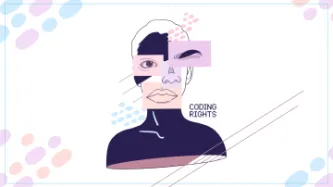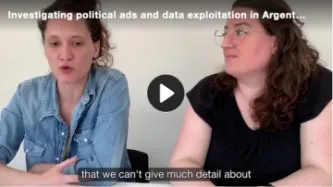Search
Content type: News & Analysis
Also available in English.A Relatora Especial da ONU sobre o Direito à Educação publicou seu relatório sobre liberdade acadêmica - que, entre outras coisas, recomenda que os Estados banam as tecnologias de reconhecimento facial das instituições educacionais.O sistema educacional do Brasil, que se baseia no valor fundamental “o melhor interesse da criança” é um dos piores infratores do mundo. Até o momento, 1.667 escolas só no estado do Paraná adotaram uma tecnologia que, segundo o principal…
Content type: News & Analysis
Também disponível em portuguêsThe UN Special Rapporteur on the right to education published her report on academic freedom, which recommends that states ban facial recognition technologies from educational institutions.Brazil’s educational system - which is built on the fundamental value: the best interest of the child, is one of the world’s worst offenders. So far 1,667 schools in the state of Paraná alone have adopted a technology that the UN’s leading expert believes threatens student’s…
Content type: Examples
The Argentinian startup Nippy offers delivery drivers access to rest stops including free coffee, phone charging stations, and toilets in return for downloading its app and allowing it to sell the data the app collects to partners in insurance, financial services, and telecommunications. The result is to give companies like Mastercard and Movistar insight into gig workers' income in the areas where Nippy operates in Argentina, Mexico, and the Dominican Republic. The services Nippy's rest stops…
Content type: Examples
Human Rights Watch called on the national government of Brazil to amend the country's data protection law to add new safeguards to protect children online following the discovery that seven educational webistes directed at Brazilian students, including two created by state education secretariats, used tracking developed for advertising purposes to surveil children, harvested their personal data, and sent it to third-party companies. The websites watched children in their online classrooms and…
Content type: Examples
Following a report from Human Rights Watch, The Public Ministry of São Paolo began an investigation to find out whether government education platforms and services collected students' personal data and sent it to adtech companies in violation of the General Data Protection Law. Article: São Paolo ministry investigates education websites for dataveillance Publication: G1Writer: Arthur Stabile
Content type: Examples
Education experts and publishers in Brazil are warning of the negative consequences of a decision by the São Paolo state government to replace textbooks with ebooks for students over 14 starting in 2024. Many students have no Internet access, and publishers argue it will irreparably damage the testbook industry.Article: Brazilian educators oppose ebook replacement for textbooks Publication: Phys.org Writer: Phys.org
Content type: Examples
After an in-person auction in São João let Brazilian technology companies bid for a contract to supply facial recognition technology to the public school system. PontoID, which won the $162,000 contract, began secretly rolling out the technology without informing parents or students in advance. The goal was to help track school attendance; parents would receive a text message when students arrive and leave school. In some towns, more than 80% of the population are of African descent; facial…
Content type: Advocacy
Privacy International responded to the consultation on the proposed data protection bill (the "Bill") to reform the current law 25.326
We welcome the continued efforts by Argentina to provide protections for the right to privacy, already enshrined in the Constitution of Argentina. PI welcomes the main objective of the Bill, namely to regulate the processing of personal data in order to guarantee fully the exercise of data subjects’ rights in accordance with Article 43 of the Constitution (…
Content type: News & Analysis
This blog post by Coding Rights was originally published in Portuguese at: https://tinyurl.com/mediumcodingrightsTransID. It was written by Mariah Rafaela Silva and Joana Varon and translated by Erly Guedes. Illustration was produced by Clarote.On the International Transgender Day of Visibility, Mariah Rafaela Silva and Joana Varon authors of the report “Facial recognition in the public sector and trans identities: techno-politics of control, surveillance and threats to gender diversity…
Content type: Examples
Corruption scandals have added to Latin America’s challenges in dealing with the coronavirus. In Ecuador, prosecutors identified a criminal ring that colluded with health officials to sell body bags to hospitals at 13 times the normal price, and many others are accused of price-gouging for other medical supplies.
The former Bolivian health minister is under house arrest awaiting trial on corruption charges, government officials in seven Brazilian states are under investigation for misusing…
Content type: Examples
Brazil’s Federal Supreme Court has struck down a government order forcing telecommunications companies to provide access to the user information relating to the country’s 200 million citizens to enable the government to conduct phone interviews to determine the economic response to the COVID-19 pandemic. In the process, the ruling established that data protection is a fundamental right. However, privacy advocates warned that the lack of established data protection law in the country opened the…
Content type: Examples
As the mounting infection numbers and deaths took Brazil to second-worst affected in the world, the country took down the website on which it had been publishing daily, weekly, and monthly figures non infections and deaths in Braziliant states. A newspaper that supports president Jair Bolsonaro implied that some states were exaggerating the toll, and a council of state health secretaries said it would fight the changes. Two days later, the country restored the site after the Supreme Court…
Content type: Examples
Brazilian supreme court judge Alexandre de Moraes ordered Jair Bolsonaro’s administration to resume publishing complete COVID-19 statistics. The government had purged the health ministry website of historical pandemic-related data and said it would stop publishing the cumulative death toll and number of infections in order to “refine” the official data. Independent media estimated the tally at 37,312 deaths and 710,8987 infections; Bolsonaro accused the media of creating a panic.
https://www.…
Content type: Video
The incorporation of new technologies to electoral processes is a phenomenon with a global and exponential growth. Despite its benefits, online campaigning is not without challenges, and can pose threats to transparency and equity in electoral competition. Given the role of elections as foundational pillars of the democratic system and a key gateway for the exercise of fundamental civil rights, these implications must be assessed with care and through specific tools.
We at PI, together…
Content type: Examples
INTERNETLAB offers an extensive analysis of all the eight different Covid-19 related apps being discussed in Brazil at the moment. Apps were rated according to four parameters: consent, need, transparency and security. Besides this, the organisation takes a look into what permissions which app has and analyses these permissions in light of what the apps promise to deliver.
Writer: Alessandra Gomes, Maria Luciano, Nathalie Fragoso e Victor Pavarin
Publication: INTERNETLAB
…
Content type: Examples
Our partners from Coding Rights in Brazil analysed 18 different Bills introduced to the Congress to deal with the COVID-19 pandemic (in Portuguese).
Link: https://www.codingrights.org/radar-legislativo-especial-covid-19-e-tecnologia/
Content type: Examples
Our partners from Internet Lab in Brazil started a series of podcasts to discuss the impacts of COVID-19 in the country. They are all recorded and available in the website (in Portuguese).
Link: https://www.internetlab.org.br/pt/noticias/antivirus-um-programa-para-discutir-a-tecnologia-direitos-e-a-pandemia/
Content type: Examples
The former Big Brother reality TV star Matías Schrank was arrested by the Cybercrime division of the Misiones provincial police, after publishing tweets that claimed that Eduardo Rovira, the president of the Misiones legislature, had contracted COVID-19 on his recent trip to Thailand and was reckless in not immediately going into quarantine but continuing to hold meetings with other high-level government officials. Schrank was charged under Article. 211 of the Criminal Code, which…
Content type: Examples
The Argentinian company Urbetrack is developing a "Cuidate en casa" (Take Care of Yourself at Home) app that it will pitch to government agencies throughout the country. The goal is to contribute to remediating the health crisis by helping enforce quarantine. The plan is that users will download the app and complete a form with their personal details as chosen by the local authority. The app will then generate a "radial geofence" defined by the local authority, within which the user must stay.…
Content type: Examples
The Argentinian Ministry of Transport, working with the state-owned satellite company ARSAT and the telecoms regulator,ENACOM, proposed to the Executive on 31 March 2020 a platform that uses cell tower data to track people on public transport and ensure they comply with quarantine laws. By 28 March, the Ministry of Security had detained 13,006 people for violating the rules. The government believes that although compliance is high, it will deteriorate if quarantine is extended much longer…
Content type: Examples
The San Francisco-based big data company Grandata has created a heat map to show which areas of Argentina are best complying with the quarantine lockdown. Grandata used an "anonymised" dataset collected from apps that provide third parties with geolocation information. The heat map shows if an individual has moved more than 100 meters from the place where they spend most of their time, apparently without taking into account the socio-economic contexts of different cities, where individuals…
Content type: Examples
Argentina's Public Prosecutor's Office will start installing an app on the smartphones of those who violate government-ordered quarantine in the cities of Santa Fé and Rosario. The app will be installed by the province's Criminal Investigation Agency to track those who are under criminal investigation for violating quarantine. The app will send reports to the the MPA investigation office and coordinated by the Attorney General's Office. Individuals will be required to sign a document…
Content type: Examples
On March 23, Argentina's immigration agency, Dirección Nacional de Migraciones (DNM), announced that anyone arriving in the country would be required to install the free COVID-19 Ministry of Health app on their phone for 14 days to ensure they comply with quarantine rules in order to protect the population. The Office of the Chief of Staff had instructed the DNM to adopt this policy when it launched the app, also on March 23. Since launch, the number of unnecessary permissions the app requests…
Content type: Examples
The Rio de Janeiro City Hall has signed an agreement with telecomunications company TIM to use geolocation data to develop "heat maps" by cross-referencing epidemological hubs with high population density locations. Under the agreement, TIM will pinpoint the movement of its users across Rio de Janeiro through antennae-facilitated geolocation triangulation and send it online to the local government to enable it to monitor whether individuals are complying with isolation measures and assess…
Content type: Examples
The self-testing web app issued by Argentina's Secretariat of Public Innovation asks for national ID number, email and phone as mandatory fields in order to submit the test. The Android version requires numerous permissions: calendar, contacts, geolocation data (both network-based and GPS), microphone, camera, full network access; change audio settings, run at startup; draw over other apps, prevent device from sleeping.
Sources:
https://www.argentina.gob.ar/coronavirus/app
https://play.…
Content type: Examples
The free app Testeate, developed by the company Adrómeda in collaboration with the Association of Information and Communication Technologies of Mar del Plata (ATICMA) and the Chamber of Software and Computer Services Companies of Argentina (CESSI) and launched in the Municipality of General Pueyrredón on March 26, is intended to enable direct information exchange between Argentina's National Ministry of Health and the population by offering constantly updated information in any city and…
Content type: Examples
A group of independent developers in Argentina started CoTrack, a public crowdsourced effort to develop an app to track and slow the spread of the virus. CoTrack registers each user's geographic movements and looks for times when they are close to people who have been diagnosed with COVID-19. When there is a confirmed case, a user who has the app can share their data with the community so others can automatically be notified that they should take precautions. The Ministry of Health for the area…
Content type: Examples
An Argentinian crowdsourcing website is collecting information on flights with passengers who were reported as testing positive for COVID-19. Users are asked to enter their email address and the date, airline, and flight number, and tick a box to indicate that someone on their flight was infected. No information is provided on who operates the site, but the terms and conditions indicate that it uses open data flows alongside the collected data.
Source: http://www.checkmyvirusrisk.com/CO/…
Content type: Examples
In February 2019, the city of Rio de Janeiro announced that its police security operation for the annual five-day Carnival would include facial recognition and vehicle license plate cameras to identify wanted individuals and cars. Municipal officials said the system would help reduce thefts and robberies; critics dissented on the basis that a period when people are wearing masks, heavy makeup, glitter, and costumes is a bad time to test the technology.
https://riotimesonline.com/brazil-news/…
Content type: News & Analysis
Creative Commons Photo Credit: Source
In the third episode of the Gender and Privacy Series, we talk about sex and privacy with two female activists: Sarah Jamie Lewis, an expert on the security of internet-connected sex toys, and Joana Varon, founder of the female-led Brazilian NGO Coding Rights.
Listen to the podcast here.




